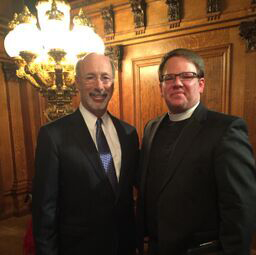Shawn Berkebile, at first glance, is exactly what one might expect as a central Pennsylvania Lutheran pastor. He’s a mild-mannered guy with glasses who serves a beautiful small-town congregation, the kind with a cemetery dating back to the Revolutionary War. He likes to use words like “ordo” and “catechumenate” when planning confirmation camp worship with his colleagues. He’s married to a wonderful woman he met while they were counselors at a Lutheran camp, and they have three adorable, towheaded children. He’s also chaplain to the local firefighter community. He’s also a huge advocate for medical marijuana, and this is where Berkebile being the stereotype of a central Pennsylvania Lutheran pastor ends abruptly.
“Three years ago, the idea of pushing for the legalization of marijuana for medical purposes was the furthest thing from my mind,” the pastor told me while we were having lunch recently. “But then, Anne happened.”
Anne is a young girl in Berkbile’s congregation who suffered from seizures every day. They were debilitating to the point where she could no longer attend school or worship. “Her parents had worked diligently in taking her to multiple doctors to see which medicines or therapies would help alleviate her suffering, and nothing seemed to work,” he said.
When they had exhausted practically every other alternative, Anne’s family resorted to giving her doses of marijuana, specifically for the calming effect that delta-9-tetrahydrocannabinol (THC) produced in their daughter. Berkebile explained to me that “the change was not immediate, but within six months, Anne had improved remarkably. She could attend church. The seizures were less frequent and less severe than before.”
There was, however, an ethical issue. Medical marijuana was not legal in Pennsylvania when Anne’s family started treating her ailment. As their pastor, Berkebile was faced with the dilemma of discerning whether he could condone their decision. It didn’t take long for him to make up his mind.

Shawn Berkebile, ELCA pastor, with Tom Wolf, Pennsylvania governor.
In fact Berkebile became a public advocate for the legalization of medical marijuana, lobbying state legislators with Anne’s story at the forefront of his efforts. Armed with statistics and medical briefings regarding the many uses for cannabis sativa (a type of marijuana) to relieve symptoms associated with a constellation of physical, mental and neurological disorders, Berkebile was instrumental in ushering Act 16, the Medical Marijuana Program, through the state House and Senate. He can be seen in photographs of Gov. Tom Wolf signing the act into law on April 17, 2016.
Today 25 states and the District of Columbia have legalized this drug for medical purposes. Although it is illegal under federal law, state legislative jurisprudence is the ultimate authority on the matter, according to a special memorandum from the Department of Justice published in 2013.
This has not always been the case. Marijuana was cultivated on this continent long before the first European colonists arrived. Over the past 300 years, it has gradually been stigmatized and inextricably intertwined with our nation’s complex racial and political history. In the 1950s, U.S. Sen. Joseph McCarthy accused Communists of using it to weaken the American spirit. White supremacists have associated it with “inferior” races and the jazz culture. Ronald Reagan’s declaration of war on drugs and actions by subsequent presidents have created a forum for draconian punishments for non-violent felons caught holding or distributing various forms of marijuana. Yet most medical experts agree that the overall health issues associated with marijuana use are no more dangerous than those of moderate alcohol consumption.
Though a bit dated, the best overview of marijuana and culture I’ve found is Eric Schlosser’s “Reefer Madness,” which was first published in the August 1994 issue of The Atlantic. When I first read this article several years ago, I quickly realized that I was very naïve in regards to whether this drug was actually harmful. The connections between marijuana legalization and the pharmaceutical industry are perhaps the most alarming aspect of this ongoing debate (the old adage of “follow the money trail” being highly apropos in this case).
Years of being told without nuance that marijuana use was a losing proposition created a bias in me that I needed to critically re-examine when I thought about Anne, a child of God whose suffering was alleviated because brave people like Berkebile were willing to question our thinking about what is good, moral and ethical.
So where is the church? Perhaps we need more typical/atypical pastors to stand up and be counted for the sake of those in our midst who suffer from chronic ailments. To paraphrase Pope Frances: First we pray for the sick, then we help them find relief. That’s how prayer works.




